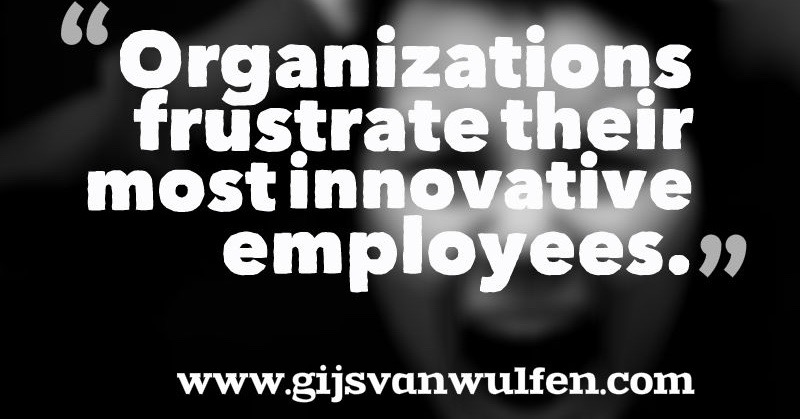Yes, innovation is extremely difficult. That's why I love it actually. My personal mission is to simplify innovation so you, your colleagues and/or clients will be able to master innovation yourself.
"How can I become a successful innovator?" is the most asked question to me offstage, after a keynote on innovation. Most people are well aware that their organisations are not able to stand still in this fast paced business environment. But a lot of people don't know how to start innovation. Most of them are afraid to fail, ending up by doing nothing, until doing nothing is a bigger risk.
That's why I like to share with you ten personal innovation lessons to inspire you to become a successful innovator.
Lesson 1: "Organisations frustrate their most innovative employees." - Organisations are rules by best practices, procedures and regulations, which is completely understandable as they want to be the best in class in their current product-market combinations. As innovator you are continuously tweaking present offerings and coming up with completely new concepts. The unfortunate thing is that they hardly ever fit present best practices, procedures and regulations. Sometimes you get the impression that everybody within the company tries to stop you, instead of giving you a helping hand. Companies really know how to frustrate their most innovative employees. Innovation is always a struggle. My personal lessons learned was that I just needed 'to learn to love the struggle'. That helped a lot.
Lesson 2: "Most Managers behave like dogs. They bark at what they do not know." - Or should I say "Most people...."? How do you behave yourself when someone reaches out to you to tell a great new idea? Do you really listen? Do you ask questions to understand what it's really about? Do you postpone your own judgement? No. Most of us don't. Something new never fits in our known patterns and routines. When dogs see something they don't know they get frightened and start to bark. We humans are so alike :-).
Lesson 3:"Managers say yes to innovation only if doing nothing is a bigger risk." - The chance that a front-end innovation project actually becomes a success on the market is one out of seven. Why should a top manager say yes to innovations with a high risk as long as low-risk line/brand extensions will still do the job? He or she won't. No, most managers say yes to innovation if doing nothing is a bigger risk.
Lessons 4: "A manager wants to control innovation and that's where it ends. A leader leads innovation and that's where it starts." - Managing innovation in a controlling way will never work, because per definition real innovation is a high risk venture with many uncertainties. If you manage real innovations like 'a normal project', it will never work. Getting an idea to the market takes a long time and the process is full of iterations. Trying to control it, in a conventional PRINCE-like structure will kill it for sure.
Lesson 5: "Real innovative leaders give both focus and freedom." - Leading innovation by giving both focus and freedom works much better. As leader make sure that your teams focus on the right strategic priorities and know what you expect from them. On the other hand, to be effective, you must give them freedom. Freedom to do it in an unorthodox way, with unorthodox partners, which keeps the passion of your innovators high.
Lesson 6: Innovation is not a person or a department. It's a mindset." - When you outsource innovation to a person or to a department most of the times nothing materialises. Innovation affects the total internal value chain, and everybody is involved. It's all about creating an innovative mindset: a way of thinking open to the world around you, which sparks new ideas and gives you the energy to take action.
Lesson 7: "You can invent alone, but you can't innovate alone." - How many people do you need in your organization to get a new concept from idea to market launch? Right. A lot of people. You can come up with an idea on your own. but you need a lot of colleagues to develop it, to produce it, to do the logistics, to do the sales and of course do the invoicing for it. So connect your colleagues in your innovation project from the start. When they are co-creators they will be the strongest supporters.
Lesson 8: "The best innovators are need seekers." - Need Seekers, such as Apple and Procter & Gamble, make a point of engaging customers directly to generate new ideas. They develop new products and services based on superior end-user understanding. Studies confirm that following a Need Seekers strategy offers the greatest potential for superior performance in the long term. Need seeking is essential, because a good innovation is a simple solution to a relevant customer need.
Lesson 9: "Think outside the box and present your idea inside the box otherwise nothing happens." - Of course you are expected to break patterns. And originality helps. But when you present your idea it is wise to keep in mind that the rest of the organization is still as conservative as ever. Your senior management might praise you for your creativity. But, will they buy the idea and give you the resources to develop it after seeing a movie, a mock up or a flash mob? I have my doubts. Don't bring them ideas, bring them business and growth potential!
Lesson 10: "If there's no urgency, innovation is considered as playtime." - Most people in your organisation focus on the business of today. An innovation will only pay off tomorrow. A lot of companies consider innovation as 'nice to have', although they will hesitate to say this out loud. It's considered by many executives as playtime, as long as there's no urgency. That's why in cost cutting programmes innovation will be one of the first activities to be killed.
I wish you lots of success on your personal innovation journey. Please share your own innovation lessons as a comment.
by Gijs van Wulfen -Inspiring you to master innovation
Also published in Innovation in Australia, BSI Innovation
---
Do you want to improve your personal innovation skills? Check out this hands-on training April 2017 in the proven FORTH innovation method.
Read more from Gijs on LinkedIn



 lynnwood
lynnwood


 Marcus Gordon
Marcus Gordon
